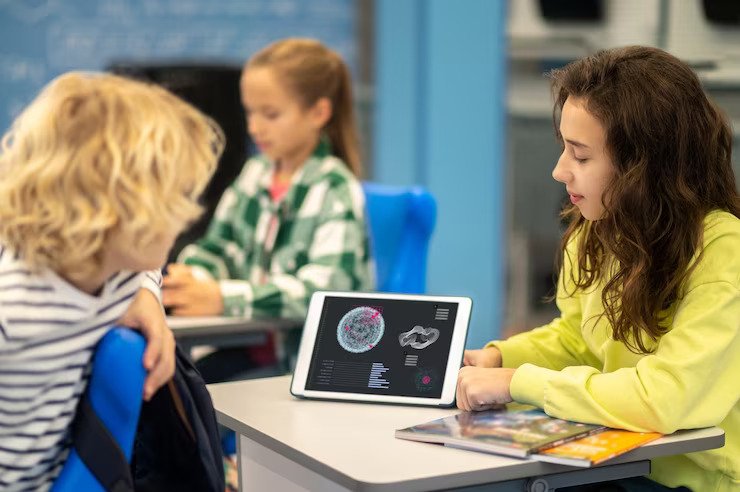The Intersection Of Technology And Health In American Schools

The digital revolution has significantly impacted all facets of life, and the education sector is no exception.
In American schools, technology has been instrumental in enhancing the learning experience, fostering collaboration, and facilitating personalized education. But beyond these academic benefits, technology is also playing a pivotal role in promoting and maintaining the health and well-being of students. From improving physical fitness to fostering mental health, technology is becoming an invaluable tool in keeping kids healthier in schools across America.
Technology In Promoting Physical Fitness
Physical fitness is an essential component of overall health, and schools have a crucial role in fostering an active lifestyle among children. Here, technology comes to the forefront as an effective means to promote physical fitness. Interactive video games, for example, are increasingly being used to encourage physical activity among children. These games, known as “exergames,” require physical movement to play, turning exercise into a fun and engaging activity.
Apps and wearables, such as fitness trackers, are another way technology is promoting physical fitness in schools. These tools can track students’ physical activity, monitor their heart rate, and calculate calories burned.
They provide students with real-time feedback, helping them understand the impact of physical activity on their health and encouraging them to lead more active lifestyles. In some schools, fitness trackers are even incorporated into physical education classes, providing a fun, interactive way for students to engage in fitness.
Enhancing Nutritional Awareness Through Technology
Nutrition is another key area where technology is making a significant impact. Many schools have started using software programs that provide nutritional analysis of cafeteria meals. These programs offer a breakdown of the nutritional content of each meal, allowing students and parents to make informed decisions about food choices.
In addition to this, there are several educational apps available that teach children about nutrition. Through interactive games and engaging lessons, these apps help students understand the importance of a balanced diet, the nutritional value of different foods, and the impact of nutrition on health.
Technology And Mental Health
While physical health is crucial, mental health is equally important for students’ overall well-being. American schools are increasingly acknowledging this fact and are leveraging technology to support students’ mental health.
Schools are using various online platforms and apps that offer mental health resources, including stress management techniques, mindfulness exercises, and cognitive behavioral therapy principles. These resources provide students with tools they can use to manage stress, anxiety, and other mental health issues.
Moreover, teletherapy – therapy provided through Internet technology – is a growing trend in schools. It allows students to access mental health services directly from their devices, offering a level of convenience and privacy that traditional therapy may not provide.
The Role Of Technology In Health Education
Health education is a vital part of keeping kids healthier, and technology is enhancing the delivery of health education in schools. Interactive online platforms are used to teach various health topics, including nutrition, hygiene, physical fitness, and mental health. These platforms use videos, animations, quizzes, and games to make health education more engaging and memorable for students.
Related: Five Areas Of Healthcare You Should Look To Invest In
Technology Tackling Vape Addiction
As the prevalence of vaping among American youth continues to rise, schools are increasingly concerned about the impact on student health. In response, technology has emerged as a significant tool in the fight against vape addiction. Schools across the country are beginning to implement vape smoke detector devices in bathrooms and other secluded areas that alert administrators when vape smoke is detected, curbing unauthorized use during school hours.
Additionally, there are a host of smartphone apps available that aim to help students quit vaping. These apps, like QuitSTART and Smoke-Free, provide resources, tips, and tracking capabilities to help users understand their cravings and progress. They use motivational messages, achievement badges, and personal logs to aid students on their journey to quit vaping.
The interactive nature of these apps appeals to the tech-savvy younger generation, making them a potent tool in combating vape addiction. By leveraging technology, schools are equipping students with resources to fight addiction, fostering a healthier school environment.
The Transformative Impact Of Technology On Health In Schools
In an era of growing technological innovation, American schools are harnessing the power of technology to promote healthier children. By utilizing interactive games, fitness trackers, nutritional software, mental health apps, and digital health education platforms, schools are fostering an environment where health and well-being are prioritized.
While the role of technology in enhancing academic success is often discussed, its impact on student health is just as significant. Through these technological tools and resources, schools are not only educating children about the importance of health but also empowering them with the tools and resources they need to take control of their own health. As a result, technology is playing a crucial role in cultivating a healthier, happier future generation.
Read Also:





























Leave A Reply